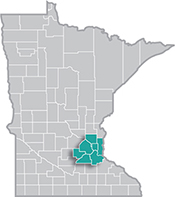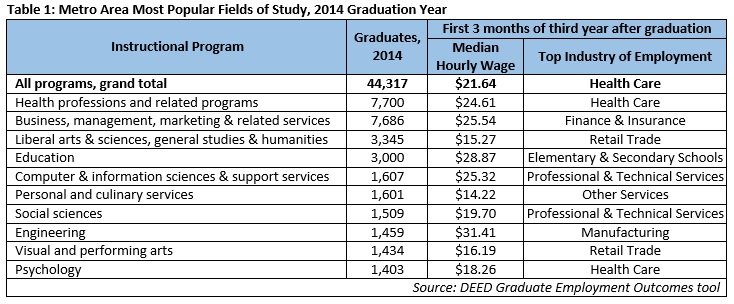 The Minneapolis-St. Paul metropolitan area is a national leader in finance, advanced manufacturing, agriculture and retailing.
The Minneapolis-St. Paul metropolitan area is a national leader in finance, advanced manufacturing, agriculture and retailing.
Medical devices, electronics and processed foods are strong suits recognized globally.
Want the freshest data delivered by email? Subscribe to our regional newsletters.
3/24/2017 2:23:55 PM
Tim O'Neill
One of DEED’s most exciting and useful data resources reveals how Minnesota college graduates are doing in the state’s labor market after completing their programs. The Graduate Employment Outcomes – GEO – tool can be found online.
GEO users will quickly learn how powerful the data is. The tool allows users to choose graduation year, school location, award type (certificates, associate, bachelor’s or graduate-level degrees), institution type (public or private, 2-year or 4-year) or specific school, and instructional program.
For example, there were 44,317 post-secondary graduates from educational institutions in the Twin Cities area in 2014. Three years after graduating, the data show that these completers were earning a median hourly wage of $21.64, over 84 percent stayed within the Twin Cities for work, and over one-in-five were employed within Health Care. Just this overview of graduate outcomes can give users a better understanding of post-secondary alignment with the labor market.
Going a step further, users of the tool can determine which programs are more aligned with labor market demand, in terms of employment rates and wage levels.
For example, there were over 1,400 engineering graduates from metro area schools in 2014. Three years after graduating, they were earning an average median hourly wage of $31.41, the highest median wage outcome of the most popular instructional programs for metro area graduates (Table 1). Digging into GEO data, nearly 60 percent of these graduates were working within manufacturing, with an average median hourly wage of $32.69, or professional and technical services, with an average median hourly wage of $29.19. One could also discover that the most popular engineering programs were mechanical engineering; chemical engineering; electrical, electronics and communications engineering; and civil engineering.

To learn more about the strengths of using GEO data, see Alessia Leibert’s article, Choosing the Right School and Major. Leibert is the research project manager in DEED’s Labor Market Information Office.
Data within the GEO tool comes from both the Minnesota Office of Higher Education (OHE) post-secondary graduation records and wage records from all employers subject to Unemployment Insurance taxes in Minnesota.
To discover more on graduate employment outcomes in the Twin Cities, contact Tim O’Neill at timothy.oneill@state.mn.us or 651-259-7401.